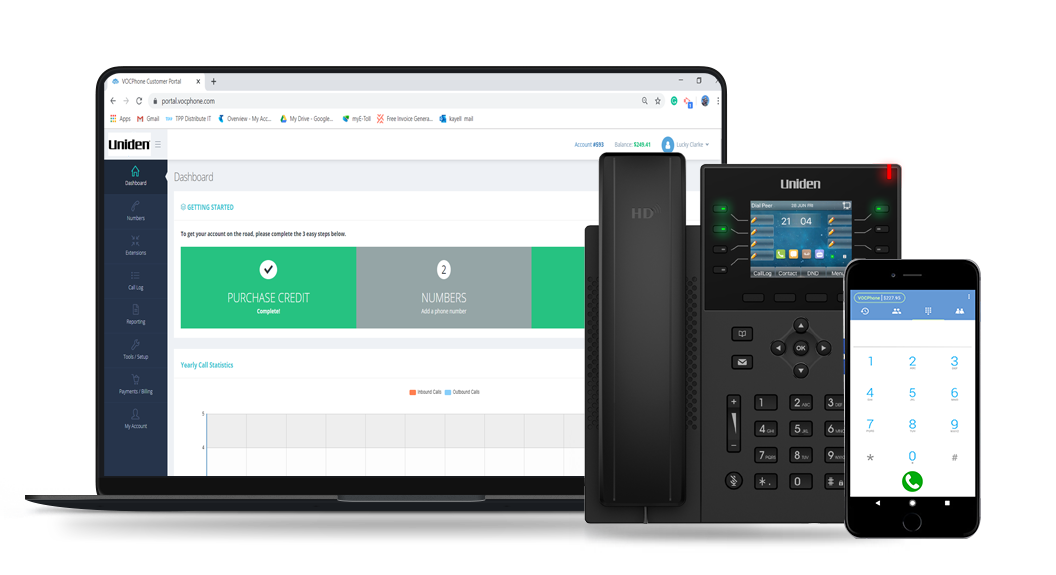
Improve the patient experience with VoIP for healthcare
Discover how you can improve patient experience and care quality by investing in class-leading VoIP phone systems.

Discover how you can improve patient experience and care quality by investing in class-leading VoIP phone systems.
Responding to emergency calls quickly and efficiently is of the highest priority for healthcare institutions, as it may be a matter of life and death. Unfortunately, some patients may have to experience delays in response due to the sheer volume of calls received by healthcare institutions, especially during nights and weekends.
While this is a major problem, it’s not unsolvable. You can invest in modern, efficient phone systems that use VoIP for healthcare institutions. These phone systems can on average save about 32 minutes of call time per day, which may allow you to respond faster to patient requests. But, this is not the only benefit healthcare institutions can experience.

Reduced instances of on-hold calls mean healthcare providers can know about the needs of patients faster and attend to them promptly, which may help them provide a better quality of care. This also reduces the risk of emergency health conditions escalating—which may cause complications during treatment—giving patients a higher chance of recovering.
Many healthcare institutions maintain digital patient records. That said, healthcare professionals might have difficulties finding and sharing these records if they are stored in disparate systems. Phone systems with VoIP for healthcare often have integrations with storage services like Google Drive, which can make sharing medical records easier.
Studies show that 80% of consumers have used telemedicine platforms at least once and with the latest advancements in tech, many patients now expect to consult and receive medical advice over the internet. Many cloud phone systems offer video conferencing, which can facilitate service delivery over the internet, catering to increased market demand.
Studies across countries involving hospitals have repeatedly shown that patients show higher levels of satisfaction when there is good communication. Now more than ever, patients expect better communication from their healthcare providers. You can enhance your communications with your patients by upgrading to a phone system based on VoIP solutions.
VoIP phone systems with call routing features can help you ensure calls from patients reach the right medical specialist without delay.
These two features can facilitate faster and more efficient communication in case a medical representative is unavailable to attend a call.
Phone systems that integrate with CRMs, telehealth platforms and EHR systems can improve efficiency, thereby improving satisfaction.
Medical professionals can rely on automated reminders about appointments and other patient care processes, freeing up time for staff.
Your staff can use video conferencing features available with VoIP for healthcare to provide consultations and consult other doctors.
At Uniden, we offer tailored VoIP phone systems for healthcare institutions, so you can focus on providing quality care for patients without having to worry about call routing and missed calls.
With 40+ advanced cloud features designed to transform how your patients and staff connect, you can take patient satisfaction to unprecedented levels.

Get in touch with our team to get tailored cloud VoIP solutions for your healthcare organisations.
Cloud-based phone systems enhance patient care in several ways:
Intelligent call routing and automated assistants ensure prompt responses to patient inquiries, even during emergencies.
Efficient communication tools facilitate collaboration between healthcare professionals, reducing the risk of errors and ensuring continuous patient care.
Advanced features allow healthcare providers to offer a more personalised and attentive experience, building trust and patient satisfaction.
Cloud-based phone systems offer robust security features to protect sensitive patient information, including encryption, access controls, and secure data storage in data centres. Regular updates address the latest security threats, ensuring compliance with healthcare regulations and safeguarding patient data from breaches.
They eliminate upfront hardware costs, reduce maintenance expenses, and offer scalable pricing options. Healthcare facilities can easily adjust their phone system to meet changing needs, paying only for the features and capacity required.
Some of the key features include improved mobility and remote access, unified communications for enhanced collaboration, and detailed reporting for valuable insights into communication patterns. These tools enable healthcare providers to stay connected, productive, and efficient in their communication workflows.
Many cloud-based phone systems offer integrations with various healthcare software, including Electronic Health Records (EHRs), Practice Management Systems, and Telehealth Platforms. This integration streamlines data sharing, enhances workflow efficiency, and supports remote consultations and telemedicine initiatives, ultimately improving patient care and communication within healthcare organisations.